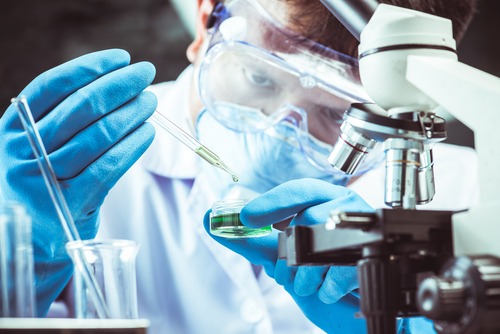
Mounting a rapid and effective response to emerging public health threats is a continuing challenge, which will only become more important in an increasingly connected world, says Dr. Richard Welch, vice president and head of development services at Emergent BioSolutions Inc., a global life sciences and product development company.
Critical to such responses, Welch said during an April 1 webinar, is the ability to rapidly develop, scale and manufacture novel vaccines and therapeutics.
Emergent, which has expertise in vaccine and therapeutic development and manufacturing capabilities and capacities, is leveraging its product development experience via its molecule-to-market contract development and manufacturing (CDMO) services, which Welch said makes the company “uniquely situated” to support both commercial and government endeavors “as we go into pandemic preparedness.”
During the Fierce Healthcare webinar, Welch provided an update on Emergent’s latest innovations to speed up a development path to treatment and prevention of COVID-19, discussing how the company has leveraged its development and manufacturing network and close relationships to support innovators in producing vaccines and therapeutics to respond to such challenges.
Specifically, Welch said among Emergent’s six key requirements for pandemic preparedness are to establish partnerships with government entities or NGOs and to use platform processes and technologies.
Established partnerships is a strong way to get the financial resources and guidance that companies may not have, he said, noting that many innovators, in fact, don’t have the resources to self-fund the development of a pandemic vaccine or therapeutic.
So partnering with the U.S. government or NGOs are key for many innovators to support manufacturing, clinical and non-clinical studies, said Welch.
Emergent, for instance, is one of two remaining Biomedical Advanced Research and Development Authority (BARDA) Center for Innovation in Advanced Development and Manufacturing (CIADM) teams designated by the U.S. Department of Health and Human Services (HHS) to develop and manufacture medical countermeasures to support public health emergency needs with commercial and government partners, and has worked in partnership on several infectious disease outbreaks in recent history, Welch said.
“What’s really important in this partnership is having an understanding of how these three-way partnerships work,” said Welch, pointing out that such an understanding “really helps to decrease misunderstandings and move things forward much more quickly.”
For instance, when Emergent is looking at doing development and supporting external partners, Welch said the company basically considers two different approaches: a platform processes and technologies approach and a non-platform technologies and innovative approach.
“Clearly, the key part of getting clinical trials materials out in a platform is the speed,” among others, so platforms have a lot of advantages, he added.
However, platforms aren’t always suitable for an existing pandemic and may not fit into available facilities, Welch said, adding that many platforms also require varying levels of development.
In other words, different platforms are going to stimulate immune systems differently, so Welch said that it’s best to go with multiple platform and non-platform approaches regarding a pandemic “because you don’t know what will work.”
On the flip side are non-platform technologies, which Welch said are more varied. Different technologies can be employed to deal with different requirements to treat the disease state, he said, such as an antibody versus a cell-based response.
But non-platform technologies are slower, require both process and analytical development, and have more varied manufacturing requirements, said Welch, adding that such variations and changes should be taken into consideration for development.
“With that in mind, one of the things that Emergent has been looking at as we continue to try to support different emerging infectious diseases, epidemics and pandemics, is really getting speed and innovation within the development first,” said Welch. “If we get a platform that comes in that does truly fit a plug-and-play, [then we’d do] a quick demo run and we would get it into manufacturing as quickly as possible.
“Obviously, some of them that do require variations in process parameters … the ability to quickly run through development in parallel is very important,” he said.
Welch also noted that when a company is doing its development work, it should have systems that model the available manufacturing systems. “Otherwise you may end up with a process that does not fit your manufacturing,” he said.
Toward that end, matching systems and equipment to receiving manufacturing sites also decreases transfer time and risk, he said.
“Focus on the analytics, maybe even before you focus on the process,” Welch advised. “Because if you can’t measure what you’re doing in development, you don’t know if you’re improving things or making them worse.”
Emergent is currently fast-tracking its development of potential plasma-based treatments, among other efforts, for patients with coronavirus disease 2019 (COVID-19).
On April 2, Emergent announced it received $14.5 million from BARDA, which is part of the U.S. Office of the Assistant Secretary for Preparedness and Response at HHS, to support its COVID-HIG program, one of two hyperimmune development programs Emergent unveiled in March.
COVID-HIG is a candidate human hyperimmune product Emergent is developing as a potential treatment for COVID-19 in severe hospitalized patients and high-risk, acute symptomatic patients that would prevent a person from progressing to severe symptoms. Emergent plans to manufacture COVID-HIG using plasma donations from people who have recovered from COVID-19 with antibodies to SARS-CoV-2.
At the same time, Emergent and the National Institute of Allergy and Infectious Diseases (NIAID) together will incorporate the COVID-HIG product candidate into one of NIAID’s clinical studies to assess treatments for COVID-19 once clinical material is available and the study begins. Emergent already has initiated plasma screening and collection of human plasma with antibodies to SARS-CoV-2 that will be further purified and concentrated through manufacturing of COVID-HIG.
Emergent also will deploy its HHS-partnered CIADM to help companies advance COVID-19 vaccine candidates through manufacturing, said Robert Kramer Sr., president and CEO of Emergent.
“In the current pandemic scenario where no preventative or therapeutic options for COVID-19 are available, public-private partnerships such as this are essential to the rapid development of medical interventions,” Kramer said.




